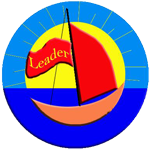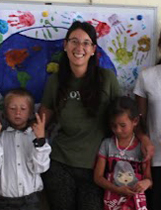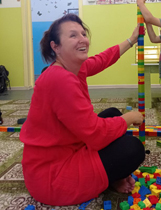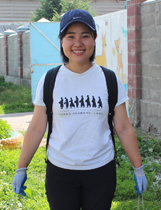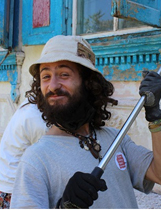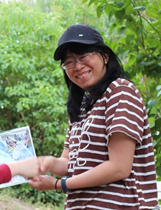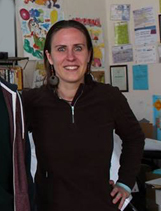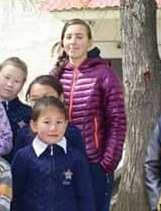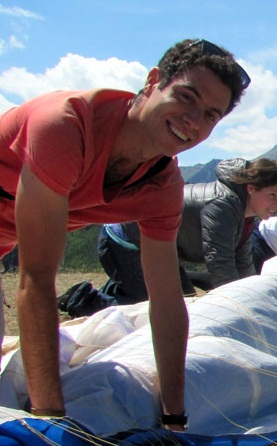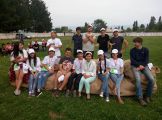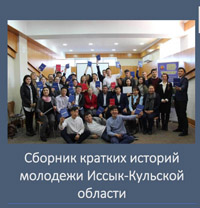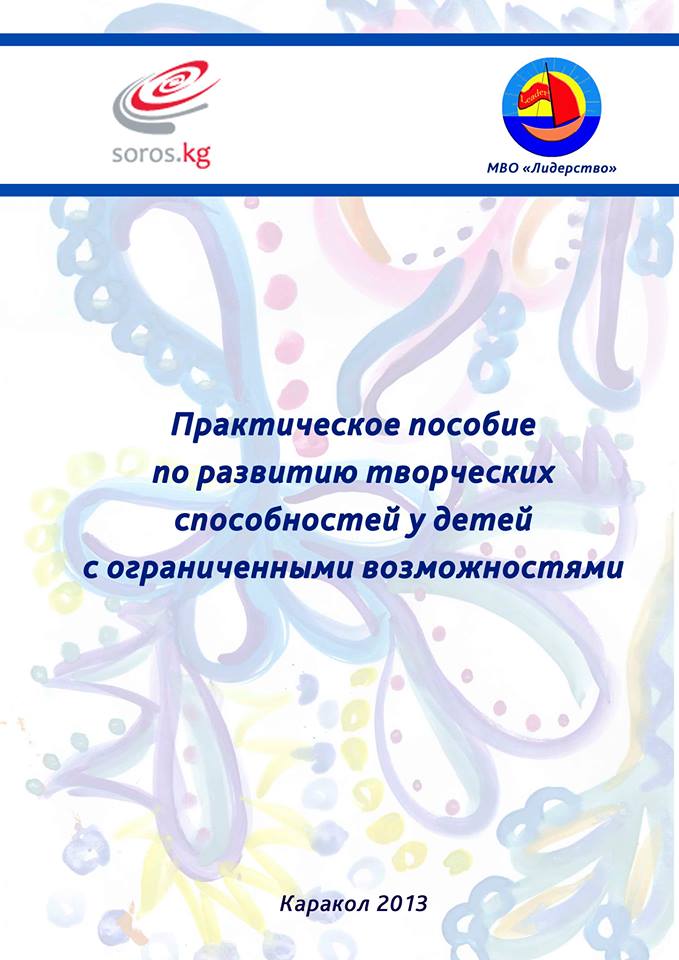- Details
- Hits: 13708
Feedback frome work-camp “Save the planet”
International volunteer work-camp 2016 Kyrgyzstan “Save the planet” LS-04
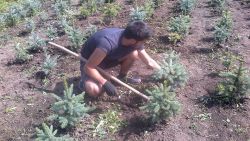 You are now reading the report about the work camp being hold at the Aksuu nursery forest (Issyk-Kul region, Kyrgyzstan) from 28 July to 10 August 2016.
You are now reading the report about the work camp being hold at the Aksuu nursery forest (Issyk-Kul region, Kyrgyzstan) from 28 July to 10 August 2016.
This report has been written by the camp leader Jibek Turgunbekova. I hope that this report will be extremely useful for those who consider coming to such a work camp in Kyrgyzstan next years.
Hello, my name is Jibek and I am very glad that I can share my experience as a camp leader of the work camp. This is my first experience of leading something like that. I am from Bishkek, Kyrgyzstan, and it was my first time coming to Aksuu and the forest in particular. The landscape over here is very gorgeous – you will see huge territories of pine forests, beautiful views of the Issyk-Kul valley. The Issyk-Kul lake will not be visible during the camp as the camp is conducted at some distance from it. While at the camp, we lived at the three-room guest house in the forest. You may think that a guest house is something like a hotel, but no – it is just a simple house where the volunteers and tourists can come and stay. The house is located up at the mountains, so it takes 30 minutes to walk to it from the highway. It is very good physical training for your legs and muscles.
There was a guard’s house right next to our house, so we definitely stayed in a safe place. We were blessed to drink mountainous water from the natural source. The forest is safe – there are no bears or wolfs as you may think.
I was leading a group of seven volunteers – five of them were from France and two of them – from Spain. Four volunteers from France were high school students aged from 16 to 17. Three volunteers were university students. The oldest volunteer was 23 years old. The camp’s age was 15+. There were six volunteer-boys and only one volunteer-girl at the camp.
Our camp was a mixture of working at the forest and discovering Kyrgyz culture.
July 28 (Day 1). It was a day of arrival the volunteers to Karakol. I arrived in Karakol with 4 volunteers, as we met each other in the Bishkek bus station. Local volunteers of the “Leadership” youth organization showed the way to the place for lunch. Rest of the volunteers, who came to Karakol on their own, joined us at the lunch. Local volunteers gave Kyrgyz name to two ones. So, Abel from Spain has become “Abylbek”, and Thomas from France has become “Timur”.
After the lunch we all went to the Aksuu forest. We came to our forest house, settled there, we received our food products – water, meat, vegetables, fruit, cookies, etc. The first dinner was pasta with meat.
July 29 (Day 2). As the day before there was heavy rain, we didn’t worked at Day 2. Instead, we went to Karakol to meet with Anastasiia (Head of the “Leadership” youth organization) and talk about the Karagat Fest. The Karagat Fest is the festival which is held annually at the Issyk-Kul region. It is a place where farmers who grow berries and fruits represent and sell their production. Besides berries, at the Fest you can buy honey, fertilizers, eco-friendly innovative technologies, etc.
After having a meeting about the Karagat Fest, we all went to have lunch. We all ate traditional regional dish “Aflyan-fu”. It is a dish of Uigur cuisine, a cold spicy soup. Volunteers liked it. Then we went home and I cooked plov for them. Plov is a traditional meal of Central Asian countries with rice, meat and carrots. Volunteers enjoyed it so much, so after that they were constantly asking me a recipe and even one day we made plov-styled pasta. Sounds interesting, isn’t it?
July 30 (Day 3). Oh, this day was full of new experiences. After having a breakfast, we went to the Kyrgyz traditional festival which was held in a neighboring village. The place of the Festival opens spectacular view to the Issyk-Kul valley and mountains. A lot of tourists came to the Festival. Brunch (late breakfast) and lunch were served in the yurt. Volunteers noted that at the brunch there was so much food on the table. I said that it is not much, it is a middle-loaded table. In Kyrgyzstan, putting a lot of food on the table shows prosperity of the family.
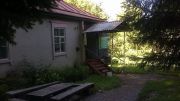
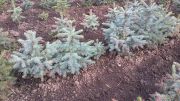

On the stage, a performance dedicated to “Urkun” was shown (Urkun is a tragic event for Kyrgyz people. It took place in 1916 when WWI was going on. Kyrgyz men were obligated by the Russian Empire to go to WWI to fight. When Kyrgyz men refused to do so, the Russian Empire soldiers (whites) came to the territory of modern Kyrgyzstan and started cruelly killing Kyrgyz people. Kyrgyz people had to escape to China).
It was truly exciting to watch Kyrgyz horse games – kyz-kuumai, ulak tartysh, oodarysh. Besides that, we got to see a Kyrgyz traditional custom of putting a newborn baby to a cradle (balany beshikke saluu), celebrating first year of a baby (tushoo kesuu), celebrating a woman’s marriage (kyz uzatuu).
Besides that, there was a dancing flash mob. We danced traditional dance “Kara jorgo” (Simon, Tristan and I came up to the stage to dance). We had dinner and the most exciting experience during the whole camp – we spend a night at the yurt. Oh, it was the first-time experience for all of us. In the morning, Simon said that it is an indescribable feeling when you get up, get out of the yurt, and see such a huge free space – the Issyk-Kul valley – in front of yourself. I would like to note that all the food at the festival was exceptionally delicious and all the volunteers liked it very much.
#yvo_leadership #workcamps #volunteers #orphanage #wearethealliance #kyrgyzstan #Ak-SuuForestNursery
Impressions from the Festival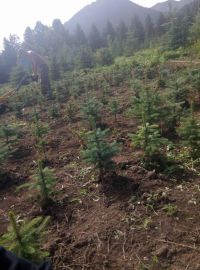
Mael: Different culture, food very tasty and good; impressive.
Simon: Generosity and kindness and smiling; horse games was awesome.
Tristan: hospitality, beautiful place and landscapes.
Thomas: very nice places and persons.
Cecile: Amazing festival, unforgettable things like landscapes, kindness and generosity of people. A taste of Kirgiz culture which is as impressive as rewarding.
Roi (in Galician): moita diferenza coa minha cultura. Durmir nunha yurta foi un sonho. Descubrin a parte boa de Israel e desfrutei moito coa xente.
Abel (in Galician) : O de onte resultou ser un bo dia. Aconpanhados duns bonitos bailes, cunha boa musica e ca companha dunhas raparigas que non tinhan dubida. Puidemos comprobar que os Kirguis comen en grandes cantidades, e que beben vodka en catidades ainda maiores. Foi un primeiro contacto interesate con esta cultura, e agardo que non sexa o derradeiro. ?
July 31 (Day 4). It was Sunday. We had breakfast at the yurt. Then, taxi driver brought us to the place to take shower. Yes, it was our first time at the camp of having a shower. We spent decent amount of time there, but water was so hot and good that volunteers felt so much refreshed. Then we got home and with the help of volunteers I cooked dimdama (cooked mix of potatoes, cabbage, carrots, onions, and green pepper).
August 1 (Day 5). Again, Day 4 was very rainy, so we didn’t work at Day 5. We went to the Office of the Forest Administration to talk to the Head. He said that we could start working as weather had got better and there were a lot of things to do at the forest. After that, we went to Karakol because I needed new shoes. The shoes I brought to the camp were wet all the time because of the frequent rains. I got afraid that I might get sick. That is why I advise all of you who is coming to the camp at the forest to bring good shoes. In Karakol, I bought new shoes and socks. We also bought some meat, water, bread, oil and cookies. We had lunch at a nice cafe. We ordered manty (traditional steamed meal - dough stuffed with meat), samsy (triangle-shaped bread stuffed with meat), etc. Then we got home and I started cooking rice with vegetable “ikra” (onion, carrots, pepper and eggplant).
August 2 (Day 6). Oh, finally this was the first working day. We started working at 10 am. The guard who lives next to us needed help with mowing hay manually. But doing it manually requires two-three days of practice, and none of us didn’t know how to do it. So went to take away weeds at the pine tree nursery forest. It is not even a forest – all the pine trees are in the process of growth. There are sectors of different pine trees – 5-10-20-30-50-100-200 santimetres height. It is very important for pinetrees to grow without weeds surrounding them because weeds’ roots take away water and nutrients which would be consumed by pine trees.
While guys were working, I was at the house preparing lunch. I made potatoes with stew. After lunch, guys had siesta and resumed working. I started making Mampar soup (it is the soup which Kyrgyz and Kazakh people love very much – soup with meat and rectangular pieces of dough). Overall, the volunteers worked 4 hours during this day.
August 3 (Day 7). Today we worked for 2.5 hours. As I had already prepared food for lunch, I went to work with the volunteers. At 12 pm the rain started, so we went home and had lunch. After lunch we went to take shower, as we didn’t take it since Sunday. After shower, at home we started making dinner – green pepper stuffed with meat, rice, and onions.
August 4 (Day 8). It has been exactly a week since we arrived to the work camp. It has become a habit to get up at 8:30-9:00 am, boiling water for tea, serving cookies, chocolate spread and bread and washing dishes afterwards. It was the third day of working at the camp. We started working at around 10:00 am. We worked for two hours, got a little tired, went home to have lunch. We rested till 2:00 pm, then returned to work and worked till 4:00 pm.
The forest employees were telling me every day that the volunteers were doing such a great job at the nursery forest. They said that the volunteers had helped so much by working in high-quality, effectively and fruitfully.
Cooking for eight people takes time, two-three hours. So, it is important for a camp leader to involve volunteers in cooking process. If volunteers have good cooking skills – that is great, if not – then volunteers have to peel and cut vegetables, so a camp leader can start cooking them. The volunteers are supposed to come to a camp leader and ask if he/she needs help.
We spend evening playing cards (“President” game), talking and listening to the music. All the forest workers are delighted to see the work that we do.
Tonight the volunteers got to try goat meat. As for me, I had never tried such delicious meat, never! Volunteers enjoyed it very much, too.
August 5 (Day 9). It was Friday. We went to work, worked for 2.5 hours till 12 pm, then had lunch and went to shower as we wouldn’t have a chance to take a shower coming weekend. We went to Karakol to a nice sauna. In the evening, volunteers started making dinner – pasta with tomato sauce.
August 6 (Day 10). Saturday. The day of the Karagat Fest came. We got up early in the morning and a bus brought us there. It was a day full of so much fun. We joined the volunteers of the “Leadeship” local youth organization. At the festival, we had a tent, under which we were making different workshops: making hair for girls, making nails, drawing pictures on paper plates, drawing on a face, selling hand-made bracelets, etc. We attracted a lot of kids, so our tent was full of small people. Boys-volunteers took a turn on wearing a costume of the Blackberry – the Festival’s symbol. All the kids at the Festival got too excited to see our volunteers at costume. Volunteers was also playing soccer with kids.
August 7 (Day 11). This day we got up even earlier than the day before. We went to Karakol, then with Anastasiia we drove to the Jeti-Oguz (“Seven bulls” – seven red rocks) and “Broken heart” mountain. The Jeti-Oguz was so impressive. Especially, the territory surrounding the Jeti-Oguz was spectacular: mountains with forests on it, clear sky, shiny sun, mountains around. Oh, it is better to see once that listen about it ? Then five of us went to paragliding. Two volunteers and I were were walking around Karakol. We enjoyed it tons, because we got to see the Main Square, the Issyk-Kul State University and the Place of the Day – the Victory Park. The Park impressed all of us because there was a special atmosphere over there. It was a nice-built park where a visitor can get to know the Heroes of the Soviet Union during the WWII who came from Karakol. After the Park, we went to one of the best Karakol restaurants where the local volunteers from the “Leadehsip” organization were waiting for us. We had nice teambuilding evening with them with tasty food, “Sniper” game, prizes, taking pictures, and dances.
August 8 (Day 12). Today we were thinking to go either to Altyn-Arashan hot springs or the Issyk-Kul lake. As the road to Aktyn-Arashan is a bit expensive and takes a lot of time, I would advise for the next year volunteer to find transportation in advance (couple days before will be fine). And also plan to spend a night there. Altyn-Arashan is a very popular touristic destination at the Issyl-Kul region. You can meet many tourists there coming from various countries. Because we started searching for the transportation at the day of going there, we couldn’t find cheap options. That is why we chose to go to the Issyk-Kul lake because the volunteers had never swam there. I think that when anyone comes to the Issyk-Kul region of Kyrgyzstan, he/she should be given an opportunity to swim at the lake. But before going to the beach we did shopping at the center of Karakol. The city beach was decent, nice and just 20 minutes far from Karakol if you take a public bus (marshrutka). This day is the last of the camp. Tomorrow, on August 9, we all are going to say goodbye to each other.
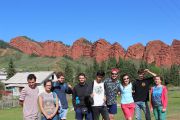
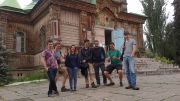
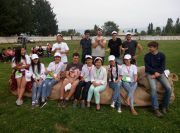
These 12 days were unique, exciting, memorable and challenging at the same time for both the volunteers and the camp leader, because all the volunteers came to Kyrgyzstan for the first time. There are so many differences in Kyrgyzstan from the volunteers’ home countries. But I can say that open-minded, positive and talkative guys came to this camp. Living in the forest where it takes 30 minutes to get to a highway, having no shops around, having no shower nearby, having only cold mountainous water, having a toilet outside the house, cooking by themselves – all those were a part of our experience. It is not hard to adapt to that, it just takes some time, few days. Eventually, everyone gets used to everything.
Despite some difficulties, I highly recommend everyone to be brave and participate in a work camp because it is a great practice of English language, attachment to Kyrgyz cuisine, culture and many stories connected with Kyrgyzstan. Be ready to help a camp leader, do house holding activities such as washing dishes, cleaning a table, serving breakfast, lunch and dinner, and help with cooking. Your camp leader will do a big job every day to make sure that your stay in Kyrgyzstan is enjoyable. A work camp is the place where you can become more mature and responsible, as you will be a part of a diverse team.
I hope that you enjoyed reading the report.
See you in Kyrgyzstan!
Sincerely,
Jibek Turgunbekova - camp leader
August 2016
Simon (16 years old, France)
Why Kyrgyzstan?
Le Kyrgyzstan parce que c’est un pays magnifique , a la rencontre des cultures sovietique , oriental , et nomade . Un vrai moyen de rompre avec la civilisation europeenne et de rencontrer avec population avec des interets et coutumes radicalement differentes
What did you do during the camp?
Nous avons , a la force de nos mains , souleve les plantes qui embarrassaient les bebe sapins de la pepiniere . Le travail etait dur , mais agreable , surtout devant les magnifiques montagnes du kyrgyzstan et le soleil d’un ciel pur .
Wishes for the next year volunteers.
Prenez du plaisir ! Et construisez de vrais toilettes
Roi (23 years old, Spain)
Why Kyrgyzstan?
Because I was really interested in Central Asia and in the Silk Road, its culture and its history, and coming to Kyrgyzstan was a good chance to start to know this zone and get prepared for future trips.
What did you do during the camp?
Working in the forest, helping the local workers to clean up the forest and make it more profitable.
Wishes for the next year volunteers.
Good luck and to enjoy this amazing area.
Cecile (17 years old, France)
Why Kyrgyzstan?
Because it is a beautiful country.
What did you do during the camp?
Work and visit.
Wishes for the next year volunteers.
Good luck.
Mael (16 years old, France)
Why Kyrgyzstan?
Because it is a beautiful country.
What did you do during the camp?
Work and visit.
Wishes for the next year volunteers.
Good Luck HaveFun
Arriver vivant revenir entier
Tristan Calas (16 years old, France)
Why Kyrgyzstan?
Tout d`abord, la decouverte de l`Asie centrale me semble etre une experience passionnante et enrichissante..Le choc des cultures qui peut apparaitre comme une epreuve eprouvante permet de s`ouvir l`esprit et briser certaines frontieres Les paysages somptueux m`ont de plus motive a voyager au Kirghizistan.
What did you do during the camp?
L`objectif du travail dans les plantations etait de degager les plantes qui genaient les jeunes sapins a se developer. Nous avons cependant eu la chance de visiter la ville la plus proche, Karakol. De plus les volontaires ont pu assister a deux festivals, le premier en tant que spectateurs et le second en tant aue volontaires pour aider a l`organisation et a l`amenagement du festival. Certaines activites m`ont beucoup plu comme le parapente ou la baignade au lac. Le camp etait avant tout de la bonne humeur, de la rigolade et de tres bons moments avec les autres participants>
Wishes for the next year volunteers.
La chose la plus importante est de prendre du plaisir, de s`ouvrir aux autres dans le respect et la tolerance. Amusez vous !
Thomas (19 years old, France)
Why Kirghizstan?
Because it is a soviet atmosphere and for me it was my first time in a such environment.
What did you do during the camp?
We work a little bit approx 15hours. And all we do takes a lot of time for example for a shower it takes the afternoon.
Wishes for the next volunteers.
Conditions are quite harsh, keep in mind…
Abel (20 years old, Spain)
Why Kyrgyzstan?
Because I want discover new places and landscape and I think it was a good way for knowing this culture; that maybe I would have never known.
What did you do during the camp?
Eating, drinking, sleeping, walking, talking, meet new people and work a little.
Wishes for the next year volunteers.
Boil water of the river before drink it, if no wanted to shit all day in the toilet. Good luck and much shit!
